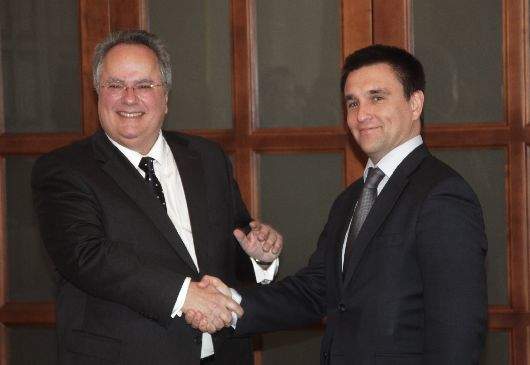 N. KOTZIAS: The development of Greek-Ukrainian relations is very important for both countries. There is a historical, traditional friendship between our peoples. Both our countries – in different ways – are going through difficult times. We feel the humanitarian crisis in Ukraine; a crisis different from and more intense than the one we have in Greece. But if there is a country that can understand the pain of people in a war and in a crisis today, that country is Greece.
N. KOTZIAS: The development of Greek-Ukrainian relations is very important for both countries. There is a historical, traditional friendship between our peoples. Both our countries – in different ways – are going through difficult times. We feel the humanitarian crisis in Ukraine; a crisis different from and more intense than the one we have in Greece. But if there is a country that can understand the pain of people in a war and in a crisis today, that country is Greece.
On this basis, we made a number of proposals to my colleague the Minister regarding how Greece might – with the limited means at its disposal – relieve the pain of the Ukrainian people; women, men and children. Specifically, we offered to provide medical care for wounded and to help Ukrainian citizens.
We are a country that trusts in International Law. We believe deeply that problems must be resolved through negotiations, through diplomacy. Consequently, we support the Minsk Agreement, as well as the recently agreed measures for its implementation and safeguarding. And, as the Minsk agreement states, we support Ukraine’s sovereignty.
We also think that we need to facilitate contact between our peoples, and we will respond to my colleague Pavlo’s request for facilitation of access for Ukrainian citizens to the Greek space. You have wonderful landscapes, you have the beautiful Dnieper, you have a great multifaceted culture. We have our beautiful islands and good weather. It would be a shame not to facilitate the Ukrainians in coming to see them.
I want to thank the Minister for the valuable information he gave me; information that is always useful for thinking about and assessing a situation.
I think that good personal relations are an important tool in diplomatic relations. Because we say we want diplomatic solutions. I told Mr. Klimkin that Greece will always be at his disposal to facilitate any diplomatic process.
A final point. We are very, very concerned in Greece about peace and stability in Europe. We are concerned at the jihadist wave in the Middle East and the instability in North Africa.
This is why – beyond our solidarity with day-to-day people, beyond our faith in international law – we believe that, for our citizens and for all the citizens of Europe, there is a primary need to maintain peace and stability in Ukraine. We don’t say this just for Ukraine or to reassure our friend Pavlo, but because it is a vital necessity for all of us.
Thank you very much.
JOURNALIST: Will Greece assist with the case of Ukraine’s European integration and the settlement of the current crisis? Will Greece support the existing sanctions?
N. KOTZIAS: First of all, regarding the first question, whatever supports the peace and stability of Ukraine will have our support. We support all the measures provided for by the Minsk Agreement.
Regarding the sanctions. At one time, Greece adopted sanctions against FYROM. It transpired that certain parties were making money. I always argued that sanctions must be used effectively. With sanctions, you can go in one of two directions. One is to crush the party on whom you are imposing sanctions. The second is to oblige them to come to the table of peace with real will.
Together with our European partners, we are promoting – with everyone’s consent – those sanctions that bring the other side to the table for peace negotiations. In international politics, sanctions are not a tool for expressing anger or sentiment. They should have an objective.
Today’s sanctions may have the fate of the sanctions against Cuba and Iran. Sanctions must be a tool of diplomacy. They must help peace and serve diplomacy. We should avoid sanctions like the ones we used for the Balkan problem – sanctions that were not effective, as we tell all our friends. The sanctions must help the Ukrainian people, Ukraine, peace and stability, as a means of diplomacy. This is our principle.
February 19, 2015


